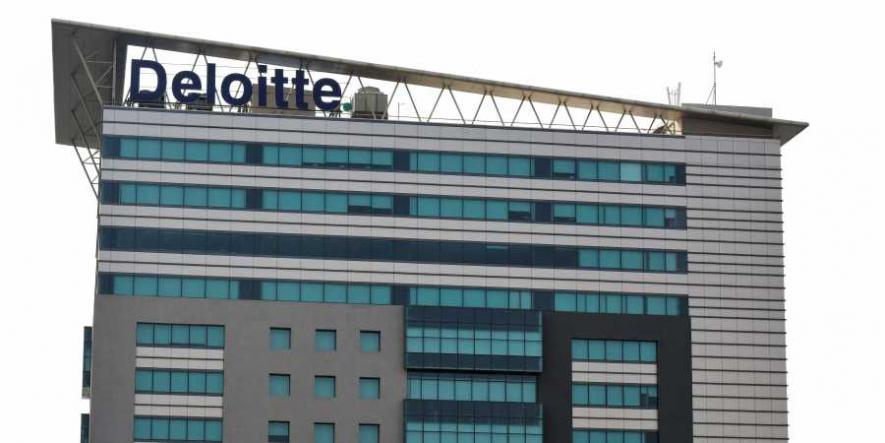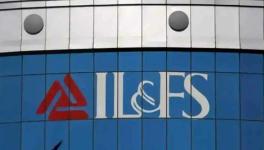MCA’s Charade of Attempting to Ban Deloitte and BSR Stands Exposed by Bombay HC

Image for representational use only.Image Courtesy : New Indian Express
The Ministry of Corporate Affairs (MCA) seemed to be doing everything right after the Infrastructure Leasing & Financial Services (IL&FS) scam came to light. The alacrity with which it moved to ban its auditors, Deloitte Haskins & Sells LLPand BSR & Associates LLP, a KPMG affiliate, was welcome, but surprising.
It was surprising because of the MCA’s own track record. In the Satyam scam which involved PricewaterhouseCoopers, another constituent of the ‘Big Four’ club, a special CBI court had sentenced two partners of PWC and several officials of Satyam to seven years imprisonment and a fine, in April 2015. Within a month, a sessions court suspended the order by the special CBI court. Even after more than five years, the MCA has till date not moved the higher courts to challenge the order of the Sessions Court.
The speed with which MCA was acted against Deloitte and BSR was therefore baffling. Were things actually changing for the better? Certainly not, if one goes by the Bombay High Court’s order. The order exposes an eye wash designed to mislead the general public.
The Bombay HC, vide its order dated April 21, 2020, has not only quashed the government’s attempt to ban the auditors, but has also brought into the public domain the extremely poor quality of investigations conducted by the SFIO (Serious Fraud Investigation Office), the lack of application of mind and the resultant “void” order for prosecution issued by the MCA. Most importantly, it exposes the lack of “will and intent” by the MCA to prosecute the auditors. The smoke screen that has been insidiously built by the MCA lies shattered.
High Court’s order exposes MCA
A deep dive into the 198-page order of the Bombay High Court on April 21, 2020, which quashed the government’s attempt to ban Deloitte and BSR in the IL&FS scam establishes that the MCA continues to protect the rich and powerful auditors.
The SFIO’s report of 750 pages with more than 30,000 pages of annexures formed the backbone of MCA’s case.
Contrary to the perception that is being created, the quashing order came not only due to a “point of law”, but because the SFIO/MCA did not demonstrate even a single fraudulent transaction in a scam pegged at over Rs 90,000 crore. The HC order also found it highly improbable that two officers of the MCA could peruse of this voluminous report in less than 30 hours!
Effectively, the High Court order exposed the complete lack of “will and intent” on the MCA’s part to act against the auditors. A few excerpts from the 198 page order will establish this.
(Reference in brackets are to page numbers of the High Court’s order).
One: The processing note on the SFIO’s 750-page report with 30,000 pages of annexures was prepared in just a single day by someone not associated with the case.
The HC observed: “It is not the plea of the respondents that the officer who prepared the processing note had already worked on the case and as such, it was possible for him to prepare that note within a short time between 28.05.2019 to 29,05,2019.” (pp 171)
Two: This note and the complete SFIO report of more than 30,000 pages was then considered by two officers, who were not associated with the case, in less than 30 hours.
Again, the HC observed that, “This note & the report running into 750 pages was then within 30 hours considered by two officers that too, one after the other, which appears to be highly improbable”. (pp 172)
Three: Order dated 29/5/2019 to lodge prosecution was given with “non application of mind” and is therefore void.
The Bombay HC observed that, “The haste with which direction to lodge prosecution was given in less than 30 hours after receipt of a 732 page report of SFIO with about 32,000 pages as annexures,....shows non application of mind (sic).” (pp 175)
“Order dated 29/5/2019 is therefore void and therefore it is not existing. Action initiated on the basis is therefore void and unsustainable.” (page 179)
“The direction by the Central Government under S. 212(14) impugned before us itself should have shown whether any one instance of financial bungling has been fully investigated into & its prima-facie shows commission of an offence or not…. The direction dated 29/05/2019 is therefore untenable in law.” (pp 192)
Fourth: Report based on one subsidiary only, does not reveal any fraud or tampering
The HC observed that, “This report (732 + 32000) is on IFIN only and its transactions with other group companies or third parties have not been looked into…. Parties have not invited our attention to any one transaction which has been investigated into fully & reveals some fraud or tampering.” (pp 181)
“Respondents do not pick any one transaction as an illustration of full investigation and did not attempt to demonstrate that it is complete in all respects. There is no endeavour to show that the book entries in relation to it are false, fabricated and the investigation by SFIO into affairs of other Companies or into cross linkages can not have any impact on it.” (pp 183)
“Respondents do not even whisper that “such” transaction is prima-facie sufficient to sustain the charges for which the prosecution is directed.” (pp 183)
Fifth: Processing note not shared with the auditors, thereby providing them with an excuse on account of denial of natural justice.
The HC observed that, “Alleged processing note prepared by somebody to facilitate its consideration is also not given to the petitioners despite demand. These documents are not produced before us also to help us to understand the situation.” (pp 182)
Wrong section invoked by MCA
The MCA is very different from its peers. As the ministry in charge, it is actively involved in formulating the Companies Act, 2013, and allied legislation, and therefore fully understands them. The best experts are at its beck and call.
Yet, it made a basic mistake in its attempt to ban Deloitte and BSR. It wrongly invoked Section 140(5) of the Companies Act, 2013. The HC has upheld the constitutional validity of the section and also ruled that it does not suffer from the doctrine of double jeopardy since disqualification is different from prosecution (pp 195, 126).
However the big blow for the MCA came with HC ruling that Section 140(5) of the Act does not deal with professional misconduct and hence is not relevant. (pp 120)
The HC has also ruled that Section 140(5) does not apply to a company auditor (CA) who has ceased to be the CA. Deloitte had moved out on account of rotation at the end of the financial year 2017-18. BSR, which was the joint auditor with Deloitte, continued to be the sole auditor till June 19, 2019, when it resigned. The HC has given this benefit even to BSR which ceased to be the CA of IFIN only on the said date, i.e., nine days after action was initiated against it by the MCA.
To be fair, should a doctor working in a hospital who has clandestinely removed the kidneys of a patient not be debarred from the medical profession just because he had left the services of the hospital by the time the illegal act was detected?
Why should it then be any different for a CA or any other professional. Accountability should be fixed with respect to a cause of action that arose during the term of the assignment and should not be influenced by the time when prosecution was initiated.
The very drafting of Sec 140(5) and its interpretations are contentious and merit a separate extensive debate.
MCA must use the potent Sections 132 and 447 of the Act
The MCA is likely to file an appeal in the Supreme Court against the HC order with respect to the applicability of Section 140(5) of the Act but it must not just stop there. The decision by the SC is likely to take time. The ministry must, in the meantime, exhaust other potent remedies available to it punish the guilty CAs.
The HC itself has shown the way to the MCA. It has ruled that CAs who defrauded the company but have completed their term can be tried for professional misconduct under Section 132 of the Act or under the Chartered Accountants Act, 1949, and can also be charged under Section 447 of the Act which deals with fraud (pp 141, 147).
Both Section 132 and 447 carry far stiffer punishment than Section 140(5), and also involve fines. Under Section 132(4)(c), debarment of the guilty auditor or the audit firm is for a period of ten years (under 140(5) the disqualification is for five years only). Penalty up to ten times the fee received can also be imposed on the firms.
Under Section 447, fraud is punishable with imprisonment up to ten years along with a fine up to three times the amount involved in the fraud. It is also a cognisable offence, meaning the accused can be arrested without a warrant.
Does the MCA have the conviction to act against the Big Four
It is clear that the MCA’s ostensible attempts to act against Deloitte and BSR are extremely feeble and porous. The apprehensions expressed in my article from July 2, 2019, have turned out to be prophetic.
It is an open secret that those who contribute “chanda” (donation) are never smeared with “keechad” (mud), no matter how grave the offences they commit. Justice Deepak Gupta, who retired recently from the Supreme Court, has publicly stated that the laws and the legal system are heavily geared in favour of the rich and the powerful.
A recent survey by the Institutional Investor Advisory Services of 63 large investors and 89 sell-side analysts revealed that 57% of them have found that the "the Big-4 audit firms have lost their credibility with investors and are therefore open to move beyond them if they were banned". Yet, the MCA continues to protect them.
The MCA has a great opportunity to redeem its reputation but will it bite the bullet? If it means business, it should demonstrate the same by immediately filing an appeal against the Sessions Court order in the Satyam case and proceed swiftly and efficiently, making full use of Section 132 and 447 of the Act, in the case of IL&FS.
If MCA does not do both immediately, at least a justification for wasting a huge amount of public money and precious time of the courts should be provided.
The writer is a senior finance professional who has earlier worked as CFO of Tata Telecom and Price water house Coopers (India).
Get the latest reports & analysis with people's perspective on Protests, movements & deep analytical videos, discussions of the current affairs in your Telegram app. Subscribe to NewsClick's Telegram channel & get Real-Time updates on stories, as they get published on our website.
























